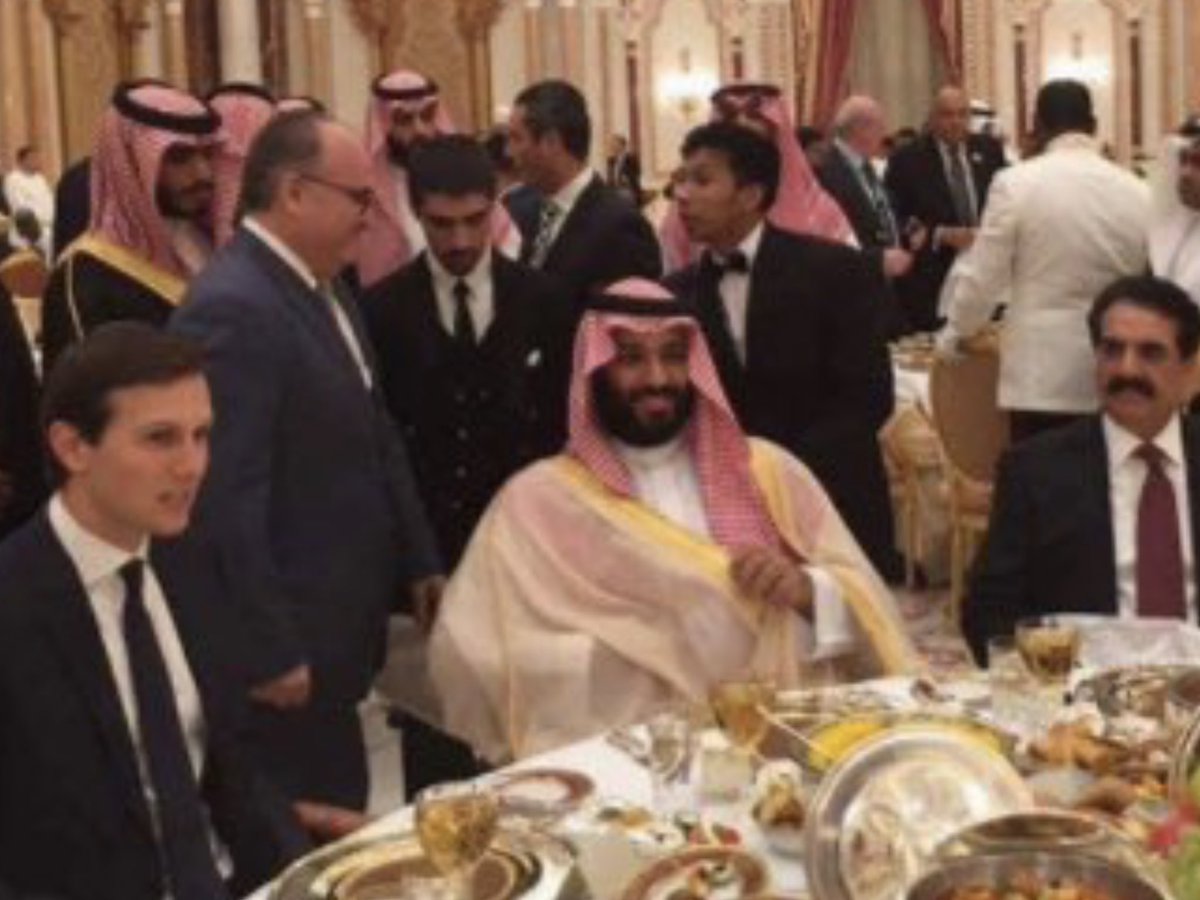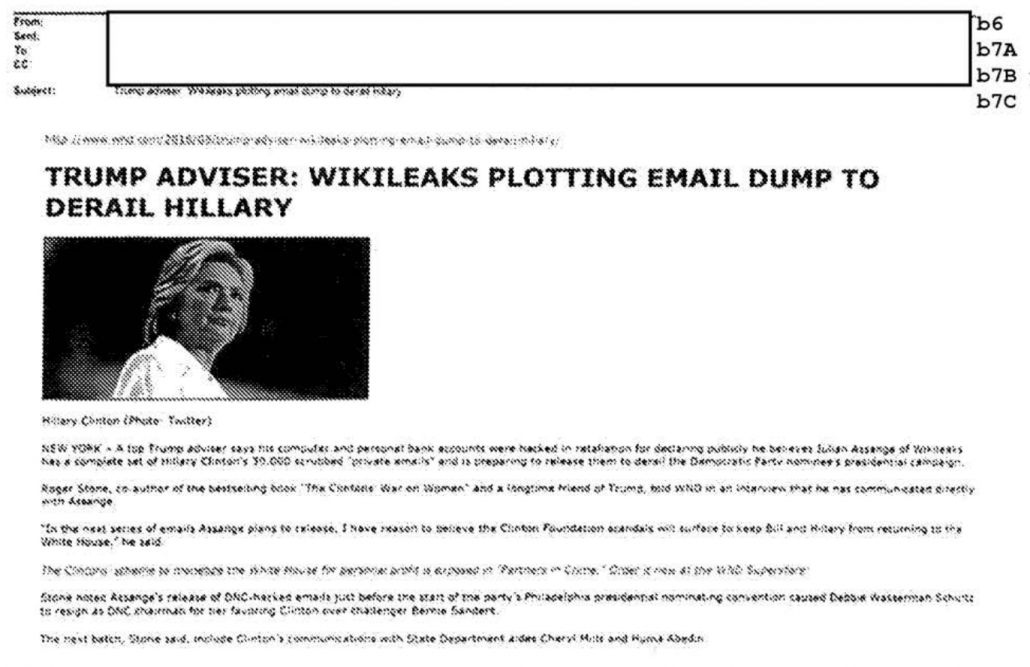Some reporters appear to be getting their understanding of the Roger Stone trial from Stone’s defense attorneys rather than from actually reading the indictment and the trial exhibits, because they report as truth that it will harm prosecutors’ case if Credico can be shown to be drunk or bragging when he suggested to Stone he had ties to Julian Assange. Here’s the NYT:
Complicating the prosecution’s case, both men appear to have repeatedly lied to and about each other. And both appear to have exaggerated their connections with WikiLeaks, either privately or publicly.
Mr. Credico testified that many of his claims regarding WikiLeaks amounted to “braggadocio” and that he repeatedly overstated his access to Mr. Assange partly as a way to “one-up” Mr. Stone.
While it is true that Stone’s lawyers are arguing that poor little Roger with the Nixon-tattoo Stone got lied to by both Credico and Jerome Corsi, that defense doesn’t actually exonerate Stone of the charges against him (which is noteworthy in and of itself). Stone is not accused of having a back channel to WikiLeaks, which claims about Credico’s credibility might undermine; he’s accused of lying about his claims about having one and who that is. Most notably, Stone is accused of lying about how he communicated with his claimed back channel(s), and no attacks on Credico can make the abundant correspondence between Stone and Credico disappear.
Consider the evidence presented to prove that Stone lied just last week, on top of what was already referenced in the indictment (which I laid out here).
1. STONE testified falsely that he did not have emails with third parties about Assange, and that he did not have any documents, emails, or text messages that refer to Assange.
In addition to having Credico and Steve Bannon introduce their own emails (and texts in the case of Credico) that mention Assange, FBI Agent Michelle Taylor introduced the Erik Prince texts described in the indictment that reference Assange (and confirm that those texts were with Prince), as well as an October 3, 2016 Stone email to Prince stating that he, “Spoke to my friend in London last night. The payload is still coming.”
2. STONE testified falsely that his August 2016 references to being in contact with the head of WikiLeaks were references to communications with a single “go-between,” “mutual friend,” and “intermediary,” who STONE identified as Credico.
As noted, the only evidence that Credico and Stone spoke about Assange post-dates the days in early August when Stone claimed to have an intermediary. Multiple comms from Credico show him pointing that out to Stone over and over and over (once even before the election and more explicitly in early 2017): he couldn’t be Stone’s intermediary because all their discussions of Assange post-date Stone’s claims to having an intermediary. Indeed, Credico and Stone even spoke about Stone’s intermediary when Stone appeared on Credico’s show on August 23, 2016.
To disprove that Credico could not be his intermediary, Stone would need to introduce evidence he and Credico talked about WikiLeaks before that. All Stone offered to disprove that were some Credico tweets from 2016 dated June 17, July 22, and July 24, none of which were addressed to Stone and only the first of which addresses upcoming email drops.
In addition, the government introduced communications that make it clear Stone was aware of Corsi’s import before he testified. For example, on March 24, 2017, Stone sent Corsi and Gloria Borger his attorneys’ letter to HPSCI stating he was “anxious to redress the false and misleading way he has been portrayed by some on the Permanent Select Committee.” That letter got sent one day after Corsi had posted the cover story he and Stone started working on the previous year.
Further, one of the most damning exhibits introduced last week shows that on October 19, 2017, Stone forwarded Credico an email from his attorney, Grant Smith, with the subject line “Credico Paragraph.” The email purported to share the paragraphs in an October 13, 2017 letter to HPSCI naming Credico as Stone’s source. But the version Smith sent to Stone which got forwarded to Credico materially differs from the one sent to HPSCI, in part by offering a half paragraph of complimentary language on Stone’s relationship with Credico that wasn’t actually included in the letter to HPSCI.
But it also includes this paragraph:
Mr. Stone noticed Credico had traveled to London on at least two occasions and conducted two landmark interviews with Julian Assange on WBAI. To be absolutely clear, Credico was only asked to confirm for Mr. Stone that the postings and interviews by Assange in which he claimed to have the Clinton data ,both of June 21 [sic], were accurate. Mr. Credico never said he knew or had any information as to source or content of the material. Mr. Credico never said he had confirmed this information with Mr. Assange himself. Mr. Stone knew Credico had his own sources within WikiLeaks and is credible. Mr. Stone concedes that describing Credico as a go-between or intermediary is a bit of salesmanship for his InfoWars audience but the confirmation by Credico turned out to be 100 % accurate. [emphasis original]
The unitaliczed text does show up in a form in Stone’s letter, albeit phrased in a way to downplay any potential request from Stone. But the italicized language does not show up in Stone’s letter. It’s effectively a script for Credico, one that might placate Credico’s concerns about Stone overstating his knowledge, but one that was false on its face.
3. STONE testified falsely that he did not ask the person he referred to as his “go-between,” “mutual friend,” and “intermediary,” to communicate anything to the head of Organization 1 and did not ask the intermediary to do anything on STONE’s behalf.
As I noted in this post, there are emails showing Stone requested both Corsi and Credico do things with regards to Assange. Two emails introduced last week prove that Stone knew he had such emails. On April 3, 2018, Stone’s lawyer Grant Smith wrote Stone cc’ing Corsi stating, “At Roger’s request, I attach the only 2 emails on the subject between the two of you.” That wasn’t true: An August 15, 2016 Corsi email stating, “More to come than anyone realizes,” is almost certainly also a reference to stolen emails.
Tellingly, the very next day, April 4, 2018, Stone sent Credico an email saying, “Everything I know about the WikiLeaks disclosures I heard from you and can prove it.”
More damning still, on March 10, 2018, Stone forwarded Credico the thread of emails, dating from September 2016, in which he requested that Credico ask Assange if he had emails on Libya. The thread includes Credico claiming, “I asked one of [Assange’s] lawyers,” a reference to Margaret Ratner Kunstler. Stone sent it as a threat — and indeed, his threats to attack Kunstler were probably among the most effective Stone used with Credico, per Credico’s testimony. But by sending it (this time not even involving his lawyers), Stone proved that he knew of the request he made of Credico in September 2016, and knew he had communications reflecting the request.
4. STONE testified falsely that he and the person he referred to as his “go-between,” “mutual friend,” and “intermediary” did not communicate via text message or email about WikiLeaks.
As the above shows, Stone not only did communicate extensively with Credico — his claimed intermediary — via text and email, but he was aware of it. Likewise, he was aware that he had communicated via email, the intermediary the government suggests he was trying to hide, with Corsi.
5. STONE testified falsely that he had never discussed his conversations with the person he referred to as his “go-between,” “mutual friend,” and “intermediary” with anyone involved in the Trump Campaign.
Ultimately, the government argues that this trial is going to be about Stone trying to hide how damning all this is for Trump, and it’s in Stone’s communications with the campaign that are most damning. Stone already proved he knew of the Bannon email introduced at trial last week when he shared it after Bannon went to the NYT. Much of the rest of the proof of this will show up in this week’s testimony, not least from Rick Gates.
Which is why Stone’s current defense story is so interesting: because it highlights that Stone continues to lie to cover up the Trump campaign’s knowledge of all this. By suggesting that Stone believed Corsi was also an intermediary for him, Stone’s lawyers are basically pleading guilty to several of the false statements charges against Stone — lies 1 through 4 as numbered here — as part of his defense! Effectively, this is not a defense to the charges against Stone. It is, instead, a new lie, meant to deny what he did not in his HPSCI testimony, that he had an intermediary, as a retreat position on his larger lie, that Trump didn’t know about any of this.
That Stone is still obstructing that fact is made all the more clear by two other exhibits introduced last week.
First, the government introduced the letter by which Stone cleaned up his lie denying speaking to any Russians. On June 15, 2018, after Michael Caputo described his testimony with Mueller’s team, Stone’s lawyer, Grant Smith, sent a letter to Devin Nunes admitting he and Stone entertained Henry Greenberg’s (whom Caputo correctly introduced to him as a Russian) offer of dirt on Hillary, only to say Stone and Trump wouldn’t spend money for such things.
Smith sent another letter on December 20, 2018, in which he asserted that, “Mr. Stone’s testimony provided during the interview was forthcoming, truthful, and wholly consistent with his many detailed public statements on the matters being investigated.” In other words, as recently as December of last year, Smith reaffirmed that Stone’s claims to have one intermediary who was Credico remained the operative story.
Given that Stone cleaned up the Greenberg story, it raises real questions why, at a time when Stone knew people had testified against him and after months during which emails proving Stone’s lies about having communications about Assange were lies had been aired publicly, Stone didn’t clean up his intermediary story in the December letter by saying what his attorneys are now arguing in court, that an epic rat-fucker was duped by a comedian and a hoaxster. That would have saved him a year of legal fees and a significantly diminished ability to work.
But it would have served to acknowledge that Corsi was an interlocutor before Robert Mueller closed up shop.
Update, 2/17/20: Fixed date on Credico email.
As I disclosed last year, I provided information to the FBI on issues related to the Mueller investigation, so I’m going to include disclosure statements on Mueller investigation posts from here on out. I will include the disclosure whether or not the stuff I shared with the FBI pertains to the subject of the post.








